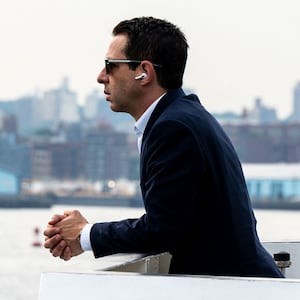Last Sunday, Succession reached its conclusion, with none of the Roy children inheriting the throne to their father’s twisted kingdom. After this surprise twist of an ending, fans were left to wonder: Did we miss the point of the show entirely?
What seemed to be a show about a company turned out to be focused on something else entirely. In fact, Succession was never about Waystar Royco, or who the Roy family’s steadfast patriarch would entrust with his company. More than capitalist gain and the question of who would inherit the company, Succession was concerned with the transition into life after a death, and if people this codependent can ever live without their loved one’s guidance.
One of the hardest things in life is navigating the death of a parent, especially when they’re a media mogul with a wide-spanning business to inherit. Over its four seasons, HBO’s dark dramedy always centered itself around mortality. Logan was confronted with the idea that he was approaching his own death since the series’ pilot, in which he turned 80. Despite his age, he continued to desperately cling to the power and respect he had always held in his media company—and the power he had over his children—as CEO. But underneath the desire of Logan’s four children—Kendall, Shiv, Roman, and Connor—to make their father proud was their own fear of Logan’s death. They were afraid not only of losing him, but also of how they would proceed afterward.
As Kendall, Shiv and Roman got bogged down in the daily politics of which of them should take the reins of the multi-million-dollar enterprise—a decision their father refused to make before his death—they overlooked the cost of inheriting his CEO title: their dad’s life. In their defense, death was not imminent for the unflappable patriarch, and he had spent most of his children’s lives taking advantage of them to an abusive degree. Unaware of the long-term price of his neglect to educate, support, or offer practical tools to help his children function without him, Logan instead focused on something much less useful in raising the Roy children. He engaged in the sport of training his children to become a worthy option for his replacement the only way he knew how, which was through verbal abuse and fostering competition.

Whether it was a homophobic dig about Roman’s ambiguous sexuality, after he passionately praised his dad in a TV interview or a cold-hearted slight about Shiv, whom he once labeled a “fucking sourpuss,” nobody was left unscathed by his cruel tongue. After Kendall’s unforgettable double-cross in the Season 2 finale when he blamed his father for the company’s historic abuse scandal in the cruise ship division, Logan told his son (via his assistant Jess) not to “act like a cunt to me, because it won’t fucking wash.” He skipped Shiv’s wedding after the two quarreled, and he often pitted Roman and Kendall against each other, including by convincing Roman to make a vote of no confidence when faced with the choice to give Kendall more power at the company. Logan even liked to remind Roman of how he put him in a dog cage as a child, in order to assert his authority.
That’s the kind of parenting that these children were contending with all of their lives. Even when the siblings banded together to overthrow their father and hold a united front in Season 3, Tom ratted them out to Logan and he quipped about their failure: “You bust in here, guns in hand, and now you find they’ve turned to sausages.”
Logan’s manipulation made it impossible for the Roy children to prepare for the idea of losing him, both as a father and as the leader of the company. However, when this life-long cycle of abuse came to an end, it was an abrupt one: Logan died after he suffered heart failure mid-flight in Episode 3 of the show’s fourth and final season. This pivotal event plummeted the Roy children into an abyss without their anchor, unsure of how to proceed with both their own lives and the company. After Logan’s death, Ken attempted to move forward, Connor sat with his unresolved despair (“He never even liked me”), and Shiv nursed the “gaping hole” in her chest. Meanwhile, Roman—arguably the child who felt the strongest (and most toxic) emotional connection to his dad—struggled to function at all (“I’m dead. That’s it for me”).
Roman’s inability to conceive of a life post-Logan left him at a loss as to how to handle himself following his father’s death, especially when faced with antagonistic comments about his late dad during the business sale. Days after Logan’s death, Roman lashed out at Lukas Matsson, while at his Gojo retreat in Norway, after the soon-to-be new owner of Waystar called his dad a prick: “Our dad was not a fucking prick... You drained the life out of him.”
Throughout this difficult grieving process, Roman’s impulse was also to turn to his brother Kendall, who shared his dad’s cutthroat nature, and ask, “What would Dad do?” It was impossible for any of them to formulate their own solutions. Instead, Logan’s children could only get through this loss by relying upon what they had left of their dad: the memory of his guidance. Even in the series finale, Shiv wanted to carry out her “dad’s plans and wishes,” which ultimately led her to vote against her brothers and sign the company over to new owners—one last attempt at getting a one-up on her siblings.

This point of conflict fueled and sustained them in their newfound grief, as without this competition for their dad’s affection (even after his death), the Roys had nothing left of him at all. When Shiv, Roman, and Ken lost the business, all that remained is their grief and the uncomfortable truth that this battle for CEO was never “just business.” It was the crutch that held their abusive family together.
When the most influential figure in your life had such a toxic impact on you, reckoning with their death becomes even more emotionally complicated. The difficult and unpredictable nature of their father’s love for them fueled the Roy siblings’ own calculated actions throughout all four seasons. In true narcissistic fashion, it seemed that Logan believed that, without him, his children would have no one left to fight with and nothing left to fight for. But while the question of who would replace Logan as CEO tormented the Roy siblings throughout their lives, in the end, it was only a distraction. None of them could live up to their dad, and part of their grief involved having to accept that they could never outrun, or fulfill, his expectations.

Despite his traumatizing efforts, Logan failed at preventing both his children’s despair and the loss of his company. The finale ends with each sibling alone, staring out aimlessly, as if they had nothing left to live (or strive) for. This was due, in part, to the Roy kids’ inability to confront the inevitable. Instead of facing the harsh reality—that Logan would eventually die, and they would have to learn to live without him—his children buried their heads in the sand, choosing to plot against each other instead of working together to support their family and the company’s future.
At the end of the finale, Shiv, Roman, and Ken are shells of their former selves. Defeated and directionless, they stare into the unknown, conceiving of a future without the guidance of the parent they relied on. Yet not all hope is lost for the Roys: They still could break the abusive cycle, as they don’t have to keep behaving like their cruel father. That hopeful revelation is what Succession had been working toward all along: there might yet be life after the death of your parent, even if it’s not the life you expected it to be.







